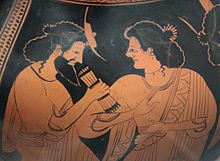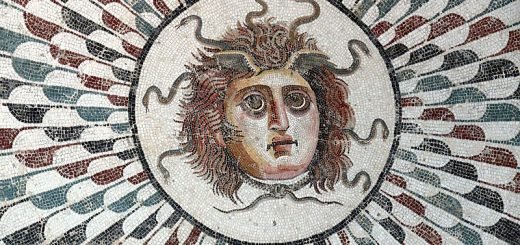Greek God Hermes: Myths, Powers and Early Portrayals
Hermes was an ancient Greek god popularly associated with trade, theft, athletics (sports), commuters, roads, invention, deception, and heraldry. Hermes’ parents were the supreme god Zeus and Maia (daughter of Atlas and Pleoine the Oceanid). After Dionysus, Hermes is considered the second youngest Greek god on Mount Olympus. He is often depicted as a messenger of the Greek gods, relaying information between the heavenly world and the underworld.
The submissions below delve into the myths, powers, and symbols associated with Hermes, the Greek Messenger God.

The Greek god Hermes with his mother, the goddess Maia
Hermes’ Symbols and Attributes
Hermes is symbolically tied to a rooster, a rectangular pillar (herma), a tortoise, a two-strapped bag (satchel). Other symbols which are closely linked with Hermes include sandals and a cap with wings.
Despite the plethora of symbols that are associated with Hermes, his number one Greek symbol is understood to be the kerikeion. When translated into the Latin form, kerikeion becomes caduceus. This is pictorially represented by 2 snakes wound together on a stick with wings. It is believed that Hermes’ caduceus had the ability to put those who gazed at it into a deep slumber. Alternatively, the caduceus could also wake people up and even bring the dead back to life.

Hermes depicted on an Attic lekythos, c. 475 BCE.
In our world today, the caduceus (as well as slightly different variations) is commonly used to symbolize trade, commerce, and negotiations. It has also been used to represent printing, writing, and eloquence in the past. Although strikingly similar, Hermes’ caduceus and the rod of Asclepius (the Greek god of medicine and healing) are two different rods. The latter has only one coiled snake around a staff. Asclepius’ rod has no wings atop it.

Today, Hermes’ Staff (the caduceus) often symbolizes trade and negotiations
Hermes’ Early Life
Mythologists think that Hermes was born early in the morning, inside a cave at Mount Cyllene, Arcadia. By midday, the newly born Hermes had made a stringed musical instrument known as a lyre. He then used the instrument to play and sing hymns, celebrating his own birthday. When it was evening time on the same day, Hermes sneaked and thieved some cattle which belonged to his elder sibling Apollo, the Greek god of light and the sun.
After the theft, Hermes unknowingly went home and tied himself up to his own cradle. We now understand why he was also referred to as the god of theft – basically, he liked to steal. Due to the level of maturity, he displayed within his early day of birth, Hermes was termed as a precocious child. He was a prodigy in every sense of the word.
Hermes’ Powers
Hermes had a lot of magical powers. He was a god who could induce people to fall asleep. At the same time, he had the ability to wake people from their slumber. Hermes gained the reputation as the only Olympian god who could travel across the border separating the underworld and the living. He exhibited this monopoly of power with decorum. Due to his ability to cross all sorts of borders, Hermes was nicknamed as “leader of souls”. Others also knew him as “the conductor”. They believed that Hermes was a god who transported the souls of dead people in hell.
The Roman god equivalent of Hermes is the powerful Mercury. The Romans revered Mercury as the god that guided the path of the dead. He was also seen as the protector of traders and shepherds. In some instances, both Hermes and Mercury have been tagged as the god of lies, thievery, and gambling.
The invention of the lyre
Hermes was a creative god who designed his own musical instrument called the lyre, at a young age. Here is how he invented the lyre: It has been said that he murdered a tortoise and removed its flesh out from the shell. Hermes then honored the seven-sister gods (Pleiades) by using 7 alimentary canals (intestines) of sheep as strings to tie the empty shell of the tortoise he had murdered.
Apollo became very mad at Hermes (his younger brother) when he realized that he stole his cattle. To calm down the nerves of his incensed brother (Apollo), Hermes used his lyre and sang hymns to placate the wrath of Apollo. Apollo had mercy on Hermes and reconciled with him. He also promised that they would forever be great friends and brothers. Some historians believe that Apollo offered an emblem to Hermes to seal his vow – it was the caduceus associated with Hermes.
Hermes as a Messenger
Hermes has been portrayed as a messenger in different myths. In one instance, Hermes accompanies Pandora (the first woman in Greek mythology) to her husband Epimetheus. He directed Hera, Athena, and Aphrodite to the location of Mount Ida. The two were supposed to be judged there, by Paris. These roles he played were similar to that of a messenger.
Association with Women and Children
Hermes was also thought to have a connection with fertility. The shocking news is that Hermes probably never got married, but that did not prevent him from rising on to find an association with fertility. There are some myths that Apollo and Hermes made love to a virgin known as Chione.
Their intimacy happened on the same day and it led Chione to give birth to the twins Philammon and Autolycus. It has been established that Hermes fathered Autolycus while Apollo’s child was Philammon. Autolycus inherited the trickery and thievery from Hermes, while Philammon became a superstar in music, like his dad Apollo.
Hermes Got Love from Other Gods
Hermes was highly cherished by the other Greek gods and goddesses. He was their darling. The god Artemis introduced Hermes to hunting. Pan, the god of nature, was the one who taught Hermes the art of playing pipes. Hermes was also very supportive to his father, Zeus. It has been suggested that Hermes ran duties for Zeus as his wingman. This was evident in one myth where Hermes was believed to have slaughtered a 100-eyed giant who was sent to spy on Zeus’ romantic affairs with Io
The Greek God of the Roads and Travelers
There is enough established evidence that Hermes acted as a messenger. Many myths have assumed that since Hermes was a messenger who frequently traveled on roads, then he was the god who took charge of the roads and protected travelers. Aside from guiding travelers, Hermes is also recognized as the god who invented different sporting activities such as wrestling and racing. Consequently, many athletes look up to Hermes as their patron.
The inventor of Speech and Music
We have already heard the story of how Hermes manufactured musical instruments to celebrate his own birthday. Consequently, Hermes has also been credited as the inventor of music. He is sometimes tagged as the god of speech and eloquence. Interestingly, he also had a sacred number which was 4. The 4th day of the month marks his birthday.
Other Portrayals

Hermes Ingenui- Early 5th century CE depictions of Hermes
In old-fashioned myths, it’s common to see Hermes portrayed as a mature man with a beard, wearing a garment over his upper body. In this way, Hermes still wears winged sandals and a cap. By the 5th century, portrayals of Hermes began to take different dimensions. In the first few centuries of the Common Era (CE), Hermes was depicted as a naked young man without beard wearing a petasus (round hat) and a traveler’s cape. He had his famous caduceus (kerykeion) in one hand and a kithara (a stringed musical instrument that is similar to the lyre) on the other hand.
FAQs
These are just a few of the many questions and their corresponding answers in relation to the rich mythology surrounding Hermes.
What are the main roles and responsibilities of Hermes?
Hermes is known as the god of trade, heraldry, merchants, commerce, roads, sports, travelers, and athletes. He is also the divine trickster and the messenger of the gods, responsible for conveying messages and leading souls to the Underworld.
How is he usually depicted?
Hermes is commonly portrayed as a young man wearing a winged hat (petasos) and winged sandals (talaria). He often carries a staff called the caduceus, which is a short staff intertwined with two serpents, sometimes topped with wings.
What are the talaria?
The talaria are the winged sandals worn by Hermes, which grant him the ability to fly or travel swiftly across great distances.
What is the significance of the caduceus?
The caduceus is the symbolic staff of Hermes. Over time, it has been mistakenly associated with medicine, likely due to its resemblance to the Rod of Asclepius, which has a single snake and is a true symbol of medicine and healing.
What are some famous myths involving Hermes?

- Hermes stealing Apollo’s cattle shortly after his birth
- Assisting Odysseus during his journey home by providing him with an herb to resist Circe’s magic
- Leading Persephone from the Underworld to be reunited with her mother Demeter
Did he have any children?
Yes, Hermes had several children. Among the most well-known are Pan, the god of the wild, and Hermaphroditus, who possessed both male and female attributes.
Is Hermes the same as the Roman god Mercury?
Yes, Hermes was known as Mercury in Roman mythology. Many of his attributes and stories were carried over, although there might be some distinctions in specific tales or characteristics.
Why is Hermes often referred to as a “trickster” god?
Hermes is often involved in tales of mischief or cunning. From a young age, as demonstrated when he stole Apollo’s cattle, Hermes displayed traits of being sly and clever.
How is he honored or worshiped?
In ancient Greece, Hermes was honored in various ways, including sacrifices and festivals. As the god of travelers, herms (pillars with the head of Hermes) were commonly placed at crossroads.




























thats ood for mywriting thx
hi what is the staff
Hermes’staff/rod (commonly called the Caduceus) was the Greek god Apollo’s gift to Hermes. The rod had the ability to make people sleep; it could also wake people up from sleep, or even the death, in some cases. For more information surrounding Hermes’ staff and the Greek god Apollo, please visit this link: https://www.worldhistoryedu.com/greek-god-apollo-myths-powers-and-depictions/
is there any other assurances with being a messenger I have a paper plz help me out
Your question is not clear, Sean